Contrary Fairy :: Part One
To everyone wishing that 2021 was going to offer hope and inspiration straight out of the gate after its most recent doom-laden predecessor, I offer my sincerest condolences.
Though I was mindful that the year would not necessarily begin with an immediate uptick in healing both literally and figuratively, the sinking feeling of misery I had watching the siege at Capitol Hill play out live with deadly consequences all the way through to the United Kingdom passing the grim milestone of 100,000 with its COVID-19 death toll was unlike anything I had expected to feel so soon after 2020’s sustained run of awfulness. January is normally a terrible time for people anyway, but 2021’s premiere month appeared to go all-out as far as existential agony was concerned.
Thankfully, one yield that the bitter wintry days of January bestow in reliably generous supply is that of brand-spanking-new media content, prominently ushered into public consciousness via a wave of over-emphatic plaudits from publications eager to hedge their bets and earn some revenue on the next big cultural moment/cash cow. Be it an operatic crime-driven procedural of Nordic origin or a gimmicky talent show that manages to straddle the line between the bizarre and the banal, there is plenty of material for you to distract yourselves with whilst you wait for Storm Christophe/Julius/Bruschetta/Whomever to pass over and are finally able to get that haircut in time for that spring party that will most likely be cancelled anyway.
One such miniseries that appears to have captured everyone’s imagination here in the UK is Russell T. Davies’ latest glossy TV drama event, It’s A Sin; a rose-tinted rendering of a time in recent history when a deadly pandemic ravaged the world and led to millions of needless deaths thanks to fatal misinformation supplied to a frightened public by that cadre of reliable villains, the government…
The more things change, eh?
CONTRARY FAIRY #1 – IT’S A SIN (Channel 4/HBO Max/Red Production Company)
** :: SPOILER WARNING FOR THE ENTIRE SERIES :: **

So, the idea of this specific skein of criticism is to elucidate some reservations I have for work that for whatever reason seems to have been given a free pass from audiences and critics alike in terms of rapturous adulation, and Davies’ latest opus is 2021’s first such disappointment. Charting the progress of several bright young things navigating their way through the AIDS crisis as it tore through London in the 1980s, Sin for better and worse bears all the hallmarks of its writer/creator’s specific style of dramatic presentation. Possessed of a neon-bright streak of righteous brazenness that thinks it is far more progressive than it is, the miniseries is undoubtedly affecting at times based on its subject matter alone but too often leans into Davies’ typical narrative gimmicks involving flashy editing, vintage soundtrack cues and gratuitous bouts of sex to paper over its thin characterizations and morality-play shock tactics.
All of this shouldn’t come as a surprise though when you compare it to Davies’ previous work, particularly 1999’s breakout hit Queer As Folk and 2015’s more contentiously received Cucumber, as the general premise shares many similarities with both of those shows; a ragtag group of pretty vacants from different walks of life who yearn for something more inclusive than what their homesteads offer them find each other amidst the exciting hubbub of a hedonist metropolis and become an adorably photogenic urban family unit, creating a horny utopia full of giddy rutting and preening insouciance that is abruptly shut down once tragedy strikes and the real-life consequences of their sexual abandon start to seep in, forcing them to readjust their priorities and do some soul-searching, if they could just stop staring at each other’s arses all the time. Precociously annoying monologues are delivered with earnest theatricality and contrived character arcs are deployed almost as jarringly as the dramatic tonal shifts, all while infinitely more likeable supporting characters pass through the action whenever the story needs them to and give the principal cast something to react against.
In short, it’s RENT Actually, but with real songs from the era rather than that happy-clappy stuff…
This mirroring of premise further extends into Davies’ character set-up, not least in the fact that out of all the archetypes that he assembles here, the one given the most screen time and development also happens to be the least likeable. As written, Olly Alexander’s Ritchie Tozer doesn’t register as an interesting enough antihero to make his transition from clueless ingenue to self-destructive sex-addict via petulant selfishness particularly arresting or tragic besides the extremity of his physical suffering, becoming yet another entry in Davies’ catalogue of sex-obsessed protagonists that we’re curiously supposed to be invested in, because apparently a strident horntoad is the ideal lead protagonist for a serial drama concerning the fallout of a deadly virus that is transmitted via unprotected sex (it’s worth noting too that other than amyl nitrate, drugs were not a thing in Soho during the 80s according to this show, one of the more curious choices that it makes). Credit should go to Alexander for finding enough vulnerability beneath Ritchie’s florid front to stop him from becoming totally awful, and the performer’s day-job as frontman for successful synthpop outfit Years & Years (or Post-Millennial Savage Garden) helps lend the character a lithe physicality that at least helps to make Ritchie’s act-out nature convincing.
In case you were wondering, on a sliding scale that sees Aidan Gillen’s seductive predator Stuart from Queer at the top and Freddie Fox’s vile Freddie from Cucumber at the bottom, Ritchie sits on the rim of the upper middle, which is just slightly above John Barrowman in anything.

The rest of the cast fare better in lesser-written roles, with Lydia West shining with sweetness and bite as chorus-girl-turned-activist Jill despite being given minimal development beyond being the fiercest ally a person could ever ask for to the point where her devotion becomes perplexing rather than moving. Omari Douglas earns some fine moments too as defiant runaway Roscoe, even if the series short-changes his dual arc of acceptance and forgiveness somewhat with some conveniently pat resolutions regarding his sense of identity and trust. Still, at least he is given far more to work with than poor Nathaniel Curtis as sensitive hunk Ashwin, who enters the action admirably enough by admonishing Ritchie for his exoticist gaze only to be demoted to little more than an insipid on-off love interest, ready at a moment’s notice for cuddles and worried looks whenever the script needs him to lend Ritchie’s story a more contrived sense of tragedy.
That these three characters also happen to be people of colour carries its own oversights. Whilst the show does better than most others by illustrating that casual racism was/is something that exists, it is only ever given surface-level lip-service that never leads to anything truly discursive or transgressive, mostly using the three protagonists as little more than sounding boards to relay the audience’s shock rather than letting them explore these themes in meaningful ways. The one time it does flirt with something more interesting in this regard is when Roscoe embarks on an affair with Stephen Fry’s kinky politician Arthur, who uses his race to try and score points with the establishment, an incongruous plot thread that somehow culminates in Roscoe pissing in Prime Minister Margaret Thatcher’s coffee. Which, fine, but then this wonderfully bizarre punchline is pulled from view in the show’s sole act of restraint, instead having Arthur flail his arms around helplessly as Roscoe sashays back into town like one of the students from Fame just in time for the protest down the road. For denying its audience the opportunity of seeing the Iron Lady herself quaff down some “caffe d’urine” alone, this show should have its card marked.
Out of the core cast, there is no doubt that most people watching will be affected by Callum Scott Howells’ bright performance as lovely Welsh lad Colin, an adorable cross between Alan Partridge and an Andrex puppy whose incandescent naivety, unwavering loyalty and sterling moral compass sets him up as being superhumanly beatific to the point of sainthood and an ideal candidate for The Pyre Of Dramatic Stake Raising. One of the most egregious examples of the show’s tonal balance becoming more precarious when handling its tragedies is when Colin devastatingly passes away after being unknowingly infected with HIV for years, and the last thing he remembers is how he contracted the virus via the one sexual partner he has ever had, juxtaposing his death with sordid nudity and sound effects that it could have easily done without, along with the distractingly noirish, Keyser Söze-style reveal of the partner in question. It’s all the more disappointing because this specific instance of sex being used as a catalyst for a main character’s shock demise is something that Davies has used before in both Queer and Cucumber, but the historical context applied to this particular instance gives this cheap plot mechanic an even more reprehensible feel than either of those series.
And herein lies my main rub with Sin; the degree to which it manipulates its audience’s emotions often goes so far as to steal away the dignity of the lives lost to the AIDS pandemic and lose sight of one of the main factors that contributed to the needless deaths in the first place. The worst example here is the final speech that Ritchie gives to his mother, a lengthy, graphic admission of how great his sex life was that we are supposed to view as a moment of triumph as opposed to the disturbingly contemptuous oration it actually is, bitterly confirming every fear to his mother about his lifestyle as a parting shot before he dies. Granted, Mrs Tozer’s transformation into a shame-filled matriarch keen to keep her son and his illness hidden away to the point of having him die alone without treatment or visits from his loving friends is an admirably divergent turn away from the unconditionally loving mother trope prevalent in these kinds of stories (and is nicely acted out by Keeley Hawes, alternating between doting worry and pernicious spite quite seamlessly) but absolving Ritchie for his behaviour and trying to position him as a charismatic poster-boy for those who perished feels misjudged. More salient points are made with succinct punctuations throughout the story via moving vignettes featuring supporting characters, such as Neil Patrick Harris’ Henry Coltrane dealing with solitary detainment in an empty hospital ward, a family burning their son’s possessions in the back garden or one man’s partner not being welcome at his funeral by their outraged family, highlighting how misinformation from the government and the medical community was as much at fault for the disease’s rampage through the UK than anything else. Every single person who lost their life to this disease had more depth and character than what was dictated by their sexual orientation and reducing them to this level of signification to create a shiny piece of event TV feels queasily offkey, however earnest the intentions were from those involved.

Of course, some people have more adventurous sex lives than others and the show’s sentiment that there should be no shame exacted on anyone for that is something more people should stand by. It is just wearying that most dramas featuring gay characters always happen to be obsessed with sex, not to mention the fact that most of the figures involved in the love scenes tend to be of a certain gender and body-type. This specific brand of skin-deepness is especially prevalent in most of Davies’ shows though, not least in the frequent montages peppered throughout that paint the action in broad enough strokes to keep everything zipping along nicely using flashy cross-cutting editing techniques, sometimes even having the characters break the fourth wall to address the audience with blithe condescension as a classic pop song provides an appropriate/ironic underscore. Admittedly, sometimes it works, such as in one bravura sequence in episode two that features Ritchie arguing his way out of worrying about the AIDS threat as Sylvester’s “Do You Wanna Funk” plays underneath, a dark choice of soundtrack that gives his speech an ironic weight for anyone familiar with the singer and the song’s producer Patrick Cowley’s personal histories. At other times, such as the end of episode three which cuts to the end credits with Queen’s “Who Wants To Live Forever” drifting into the mix after the emotional fallout of Colin’s death and Ritchie fleeing the clinic without learning his HIV test result, the effect is overbearing to the point of insult.
Now, despite the length of this nitpicky tirade, there is still quite a bit to enjoy in Sin, certainly enough that I can commend it as Davies’ finest series since Queer (though it should be said that Cucumber spin-off Banana is not included in that reasoning seeing as Davies didn’t actually write all of that, which it is all the better for incidentally, and if you haven’t seen the episode starring Letitia Wright, go do it!) As mentioned previously, the acting is uniformly very good across the board, despite the frequent hurdles of hackneyed speeches and contrived character motivations. The attention to detail in the costuming and production design is immersive enough to give the whole enterprise a gorgeously warm nostalgic hue (though as a friend of mine rightly pointed out, no one seems to get a haircut during the show’s timespan of 1981 and 1990, another curious omission) and as sledgehammer-subtle as the soundtrack often is, it is also too sublimely transportive to ignore. The whole run is so slickly edited that the pace is forgivingly fleet and at least Sin does have its heart in the right place in its attempts to convey what was a frightening time and how it tries to elicit sympathy for each of its players. Even the fact that it goes about this in such an obvious and heavy-handed way can be commended somewhat in that it should promote a healthy discussion as to the social and political discretions that encouraged this particular pandemic to thrive, a facet that has inherited a dubiously prescient dimension now given the ongoing COVID strife, despite the series being conceived and shot before any of this awfulness began to take the world hostage.
It’s just a shame that Davies’ problematic writing style gets in the way of telling what could have been an inspiring story that offered a stirring tribute to both the people we lost to this horrid disease as well as those who survived to forge a path through one of the scariest passages of queer history in our lifetime. Instead, we got…

And with that, I’m off to chipper myself up by watching some Savage Garden videos on YouTube; until next time, keep well and stay safe.
xxxo


